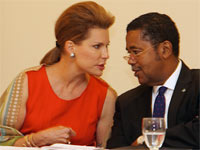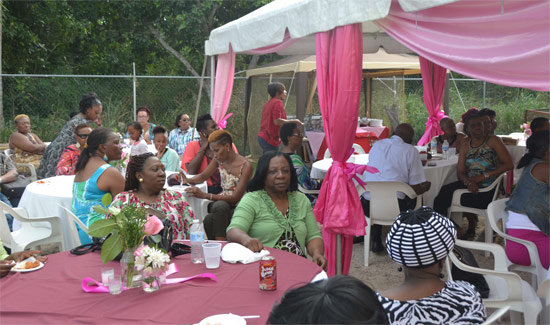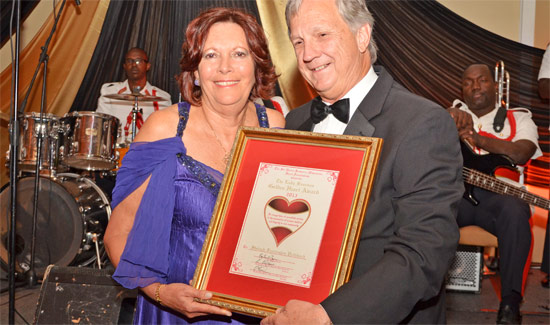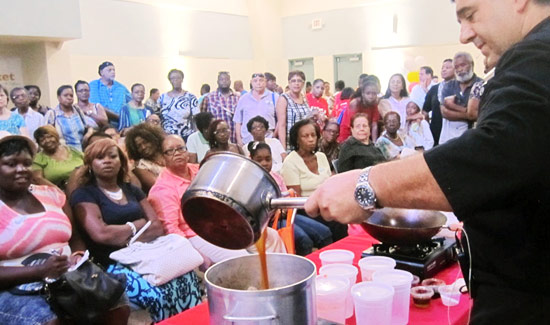
NASSAU, The Bahamas – The Princess Margaret Hospital is in the process of acquiring two new digital mammography machines to enhance the detection of breast cancer amongst Bahamian women, Dr. Perry Gomez, Minister of Health announced as he officially re-launched the Breast Cancer Programme.
The ceremony was held Wednesday September 12, 2012 at the British Colonial Hilton, where Dr. Gomez also revealed that one of the machines will be in place by September 21 at the Princess Margaret Hospital in New Providence and the other, in early October 2012 a the Rand Memorial Hospital in Grand Bahama.
“Mammography is a life saving tool for screening women without symptoms for breast cancer,” he said. “It is the number one killer in females in the country.”
The PMH is in partnership with the Susan G. Komen for the Cure organisation, Sunshine Insurance, Marathon Bahamas and other private sector organisations in the fight against breast cancer, which has become the number one killer in females in the country.
“It is our hope that the whole Bahamas inclusive of policy makers, health planners, health care providers, NGOs, clients, family members, students, teachers, insurance and all others will work to advance the programme and breast health for all men and women,” Dr Gomez said.
He deemed the re-launching of the Breast Cancer Programme as another significant milestone in the country, as steps are being taken in increasing the awareness and education of Bahamians – the effort to reduce the numbers affected by breast cancer.
Breast cancer is the most common cause of cancer related deaths for women worldwide. In 2010, The Bahamas’ mortality rate from breast cancer for women was 7.9 percent, which was the highest in relation to other cancers for that period.
Breast cancer specialist Dr Judith Hurley research has shown that The Bahamas has the highest incidence of inherited breast cancer in the world and the average woman at the time they are diagnosed is lower than that of women in the United States.
She also reckoned that 48.5 or almost 50 percent of the women in The Bahamas who are diagnosed with breast cancer are under the age of 50 a the time they are diagnosed, and a full 20 percent are under the age of 40 on diagnosis.
There is a 20-age difference when diagnosed, between women in the United States, who are generally diagnosed at the age of 62 and Bahamian women who are diagnosed at the average age of 42.
“What she also found, and like me I am sure you would be alarmed when you hear this, is that in The Bahamas, 44.6 percent – almost half of these under 50 year-old women when diagnosed – were either at stage three or stage four in comparison to the US where it is 12 percent,” Dr Gomez said.
Dr Hurley’s research also shows that 43 percent of women who die from breast cancer in The Bahamas are under the age of 50 at the time of their deaths. And furthermore, that the incidence of inherited breast cancer in The Bahamas was 23 percent of all the women that were tested compared to three to five percent in the US.
“We all know that early detection is the key to good breast health and longevity of life,” Dr. Gomez said.
Recognising the urgency of action, he said that the Ministry of Health determined the need for a focused breast cancer programme. But in recognising this, the nation lacked the resources to engage in the type of research necessary to fight breast cancer, entered into a public/private collaborative effort with Sunshine Insurance/Marathon Bahamas and the Susan G. Komen for The Cure Organisation.
“The partnership brings to us the ability to be involved with a programme whose goal is increasingly early detection of breast cancer and reducing mortality through improved awareness, increased clinical resources, and research,” Dr Gomez said.
The execution of the programme will require collaboration with all of the cancer organisations, public and private oncologists, public and private sector hospitals, other associations, groups and individuals.
In the upcoming five years, the programme will focus on establishing a minimum age for breast cancer screening, review current drafts of medical and nursing Acts in relation to the breast cancer initiative, review educational resources from Susan G. Komen for the Cure with a possibility of adapting them for use in The Bahamas, amongst other things.
Dr. Gomez thanked the partners for brining the Susan G. Komen for the Cure Organisation to The Bahamas. He also thanked the Sister Sister Breast Cancer Support Group and its partners for their initiative in seeking and acquiring a grant from Komen to finance the promotion of breast cancer awareness among Bahamians.
The Komen organisation donated $50,000. Another NGO, matched that donation. The Susan G. Komen Foundation is the most widely known, largest and best-funded breast cancer organisation in the United States. Its aim is to reduce the burden of breast cancer. Since its inception in 1982 it has developed partnerships with more than 30 countries.
By Lindsay Thompson
Bahamas Information Services
______________
Caption: Dr. Perry Gomez, Minister of Health, right, and Ambassador Nancy Brinker, Founder and Chief Executive Officer of the Susan G. Komen for the Cure Organisation interact at the official re-launching the Breast Cancer Programme, during a ceremony on Wednesday, September 12, 2012 at the British Colonial Hilton. (BIS Photo/Kris Ingraham)



